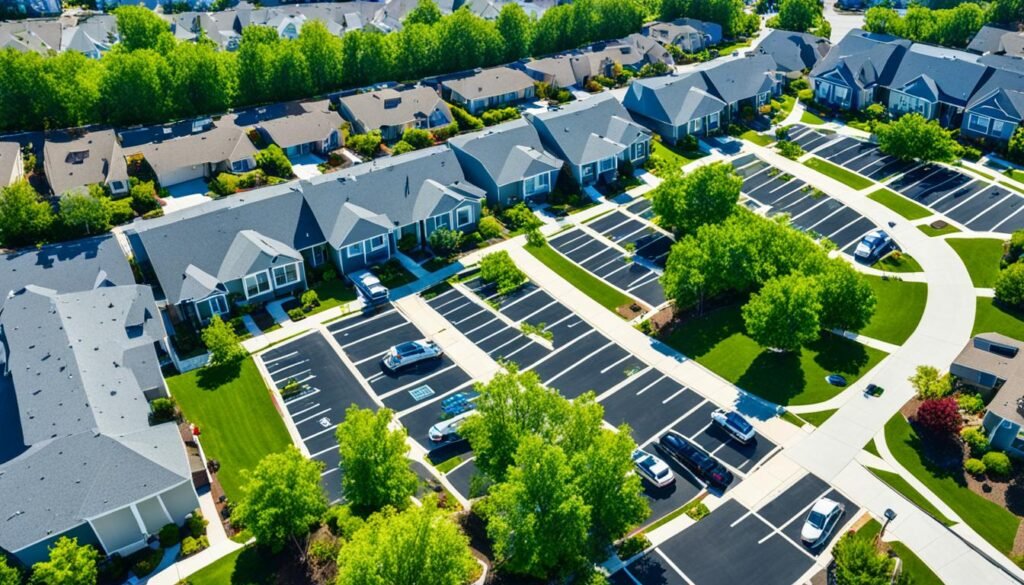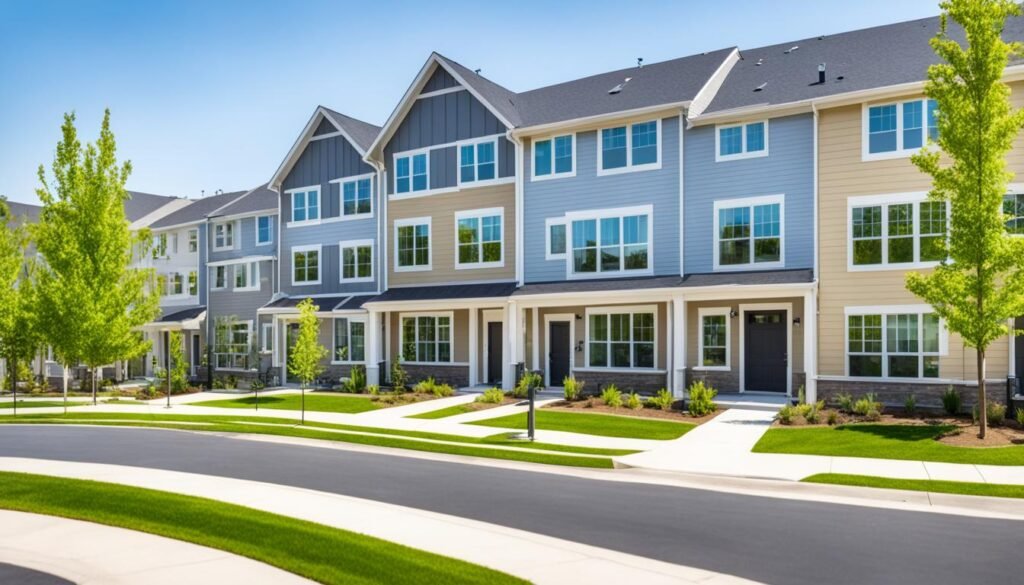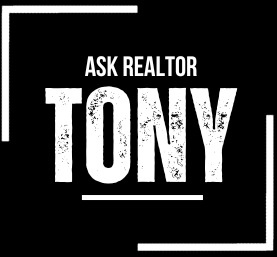
Are Townhomes Good Investments? Pros and Cons.
Townhomes represent 5.9% of the US housing market. In fact, they’re becoming more and more popular among investors, homeowners and developers alike. In the third quarter of 2023, statistics showed that 16.5% of all new home starts were townhomes, this is the best number reported since 2007. Experts expect this trend to continue but are townhomes good investments? Before diving into townhome investments, it’s vital to weigh their pros and cons. This article will guide you through both, helping you with your investment decision.
Key Takeaways:
- Townhomes make up 5.9% of total housing in the US and it appears to be growing.
- Understanding the potential benefits and drawbacks of townhome investments is essential.
- Factors such as location, market trends, and HOA regulations can significantly impact the profitability of townhome investments.
- Townhomes offer advantages like easier maintenance, prime locations, and desirable amenities.
- We’ll compare Townhouses with Condos and Detached Homes. Which is a better investment?
Unlocking the Potential: Understanding Townhomes as Investments
Investing in townhomes can be smart for diversifying your real estate portfolio. Knowing the basics of townhome investing is key to making informed choices and maximizing returns. Once you understand this property type it will be much easier to capitalize on their unique benefits.
What is a Townhouse?
Townhomes, or townhouses, are usually multi-level properties with shared walls that often include a garage. Most have a small yard or patio. They provide a mix of privacy and the ease of a condo. With modern designs and prime locations, they attract renters and buyers alike.

Quality of Life Amenities
Townhouses often have shared amenities like pools, common areas and gyms. These features make them more desirable to tenants and buyers. Luxury amenities can attract better tenants and boost the property’s value over time.
“Townhomes offer the potential for lucrative investments due to their appealing amenities and growing market demand.”
Are they Good Rentals?
Townhomes are great for generating stable rental income. The demand for rentals is rising, making townhomes a solid investment. They also offer tax benefits, like deductions on mortgage interest and depreciation. When done properly, townhomes can set the stage for long-term financial success.
Additionally, Townhomes usually cost less than single-family homes. This makes them accessible to more investors, including those buying for the first time.
Assessing the Market Appeal: Why Townhomes Attract Investors
The real estate market is always changing, and townhomes are becoming a popular choice for investors. Single family detached homes are overpriced in the present market when compared to the median household income across the country. As I stated earlier, they are in high demand and new home builders are bringing more of them to the market. They have lots of benefits for people renting them and those looking to buy.
Townhome Demand: Why are they Popular?
Townhomes are getting more popular due to a few reasons. One reason is people want affordable housing that still lets them live near cities. Location, location, location and townhomes strike a perfect balance. They offer good living space, great locations, and aren’t too expensive compared to single family detached homes.
Another thing about townhomes is their flexibility. They fit people’s different lifestyles and needs. Families, young professionals, and even retirees find townhomes appealing. The flexibility attracts many to either rent or buy them.
3 Advantages of Investing in Townhomes
There are advantages to investing in townhomes. They are easier to maintain than single-family homes. Townhomes often have smaller outside areas. Plus, homeowners’ associations help with upkeep. This makes them great for investors who have a busy schedule. Here are three reasons why tenants may prefer a townhouse over a detached home.
1. Location
Townhomes are also built in prime spots. They’re close to city centers, workplaces, and important places. Being near transportation and shopping centers makes them even more valuable. The location alone can help their value go up over time. Especially if the area is growing and new services are being added.
2. Safety and Privacy
Living in a townhome can give you a sense of safety because townhomes create close communities. Many people like this aspect, especially those who consider safety to be a priority. Regarding privacy, not so much, you’ll be living close to others and sharing common interior walls. This doesn’t mean you will not have privacy but by comparison to a detached home, the townhome will be a little less private.
3. All Inclusive Amenities
Amenities can be a big selling point! Specifically for landlords looking for great tenants. Many townhome communities offer extra perks that give it a little VIP feel. They have pools, gyms, dog parks and places to hang out. These amenities can make the property worth more in the eyes of renters and buyers. Plus, they add a sense of luxury for the folks who live in the community.

Investment Considerations for Prospective Townhome Landlords
If you’re thinking of becoming a townhome landlord, there are key things to think about. These considerations will guide you in making smart choices. And, they can help you get the most from your investment.
Financing Options
Looking into your financing choices is crucial before investing in a townhome. You should look into loan types, interest rates, and how much you’ll need for a down payment. Knowing your financial options makes it easier to pick the best way to finance your investment.
Presently, FHA and Conventional loan programs will allow you to finance a townhome. If you’re buying the property as an investment be prepared for at least a 20% down payment. Owner occupied buyers will benefit from as low as a 3% down payment with a conventional loan. Veterans can use a VA loan to purchase a townhome as a primary residence. Home buyers who qualify can use the USDA Loan Program to purchase a townhouse, no down payment and very competitive interest rate.
Landlord Insurance
Getting the right insurance is critical for townhome landlords. Landlord insurance covers property damage, liability, and lost rent. It’s wise to compare insurance policies. Talking to an insurance expert can ensure your townhome has the protection it needs. The cost of landlord insurance varies by state, some are lower and some are higher than the national average. With this in mind, it’s best to require your tenant have a Renters Insurance Policy as well.
Legal Obligations
It’s important to know the laws and duties of being a townhome landlord. Learn about local tenant laws, leases, and eviction rules. Following these laws protects your rights. And, it helps keep a good relationship with your tenants. The best states for landlords are Alabama, Arizona, Colorado, Florida, Georgia and Texas. These states offer low property taxes, no rent control, fast eviction process, no deposit limits, short notice requirements and expanded tenant rights.
Tenant Screening
Choosing the right tenants is key to a successful investment. Checking backgrounds, incomes, and references helps locate dependable tenants. These are tenants who pay on time and care for your property. If you don’t have the wherewithal to effectively handle this process, that’s okay, there’s another way, hire a property manager.
Property Management
You must decide if you’ll manage your townhome or hire a company. A management company can handle tenant issues, upkeep, and rent. Think about the costs and benefits to see what’s best for your investment. If you don’t have the time to manage the property then it’s best to hire a professional management company. My personal rule of thumb is “a happy tenant stays longer”.
Property Management Fees
Presently the average cost of a property manager is 4% to 12% of the monthly rent with 10% being most common. Some charge a flat fee but in either case be sure to interview several before making a final choice.

Strategic Insights for Townhome Investment
Investors can get more from their townhomes by playing it smart. Picking the right location is key. Look for places with growing demand and good features. Like shopping, transportation, schools and entertainment. This can lead to higher rents which will create more value and equity over time. A couple other factors to keep your eye on is the HOA and the balance of Renters vs Owners.
Healthy Home Owners Association
Having a good homeowners’ association (HOA) is very important too. Before investing, look into the HOA’s finances and rules. What are they spending the money on? Do they have cash on hand? Are there plans for property improvements? The monthly fee is also important as it will affect your bottom line. A well-managed HOA means a more valuable and appealing property.
For townhome investors, understanding HOA fees and rules is crucial. This knowledge helps make smart choices and earn more.
It’s key to know the HOA fees. These include monthly costs, special charges, and payments for services or amenities. Consider these in your plan.
“Knowing HOA rules is essential for a smooth investment path. Check the HOA bylaws before buying. Look at rules on using the property, rental limits, upkeep duties, and fines for breaking rules.”
By getting the full picture of townhome ownership and considering rental yield and HOA fees, investors can make wise choices. This way, they can earn the most from their townhome buys.
Ratio: Renters vs Owners
This is an important metric. Knowing the mix of renters and owners is crucial. A balance is best. If more owners live in the community, it usually means the area is stable. This can make it more attractive to renters and buyers alike. Also, owners are more likely to update their property which enhances the value over time.
Understanding these key factors can help investors do really well with townhomes. This market offers lots of good opportunities for those ready to take them. If townhomes have not been on your radar it’s understandable but in the present market, they are definitely worth a look.
Overall being a townhome landlord can be rewarding, but you need to think things through. Look at financing, get the right insurance, know the law, screen tenants, and decide on your involvement in managing the property. This will help you overcome challenges and make the most of your townhome investment.

Exploring the Financial Landscape of Townhome Ownership
When you invest in townhomes, it’s key to know the money side of things. We’ll look into the financial landscape of townhome ownership. We focus on calculating rental yield and navigating HOA fees and regulations.
Calculating Rental Yield and HOA Impact on Investment
To find out if a townhome is a good buy, you must figure out the rental yield. This is your yearly rent money as a percentage of the home’s value. It shows if your investment is worth adding to your real estate portfolio.
Gross Rental Yield
Understanding gross and net rental property yield is crucial for savvy real estate investors looking to maximize their returns. Gross rental yield represents the annual rental income generated by a property as a percentage of its purchase price or market value. It’s a key indicator of the property’s revenue potential.
- Let’s say that you have a rental property that generates $25,000 in rent for the year
- The current market value of the property is $375,000
- Gross Rental Yield = $25,000 ÷ $375,000 = 6.7%
Net Rental Yield
On the other hand, net rental yield factors in expenses such as property management fees, maintenance costs, property taxes, and insurance, providing a more accurate picture of the actual income generated by the investment.
- Using the example above, your rental property generates $25,000 in rent for the year
- The current market value of the property is $375,000
- Your yearly expenses are $6,250 (without debt service)
- Net Rental Yield = ($25,000 – $6,250) ÷ $375,000 = 5%
By analyzing both gross and net rental yields, investors can make informed decisions about which properties offer the best potential for profitability, helping them build a successful and sustainable real estate portfolio.
HOA Fee Impact on Bottom Line
Don’t forget to think about the HOA impact when finding this yield. Homeowners’ association fees change how much money you make. These fees pay for upkeep of shared spaces and other services. More importantly these fees are not static, they can go up over time.
Table: Using the example above. Let’s understand the Impact of HOA Fees on Rental Yield. $25,000 yearly rental income minus $6,250 expenses equals $18,750 with a property market value of $375,000. We’ll add the HOA fees to the expenses and show the more accurate Net Rental Yield.
| Gross Rental Income | Annual Expenses | Annual HOA Fees | Net Rental Yield |
|---|---|---|---|
| $25,000 | $6,250 | $200 x 12 = $2,400 | 4.3% |
| $25,000 | $6,250 | $400 x 12 = $4,800 | 3.7% |
| $25,000 | $6,250 | $600 x 12 = $7,200 | 3.1% |
This table shows how HOA fees change your yield. When fees go up, yield goes down. This affects how much money you make. Is there a way to offset the HOA fee expense? Yes there is, if the market will accept a rent that includes the HOA fees or some of the HOA fees. Passing along the cost of Trash, Water and Sewer to your tenant is not unheard of.
So, Are Townhomes Good Investments?
When looking at real estate, checking out different options is key for your money goals. Comparing townhomes with single-family homes is common. Each has benefits and downsides that can impact your choice.

Pros and Cons: Weighing the Investment Decision
Considering the good and bad points of investing in townhomes is vital. Think about your investment goals. Decide if they match the benefits and drawbacks of townhomes.
Pros of Townhome Investments:
- Lower purchase price and better cash flow possibilities.
- Simpler maintenance thanks to help from the HOA.
- Access to good amenities and locations.
- Ability to attract different kinds of renters.
Cons of Townhome Investments:
- Slower increase in value compared to single-family homes.
- Rules and limits from the HOA can be a downside.
- HOA fees can be high.
- They might attract short-term renters more than long-term ones.
How Do Townhomes Stack Up Against Other Property Investments?
Townhomes have unique benefits and there own set of concerns. It might be the best property type for you but before making your decision, let’s compare them to condos and detached homes.
Comparative Analysis: Townhomes, Condos, and Detached Homes
Let’s look at the good and bad points of townhomes, condos, and detached homes. Each has its own features affecting maintenance, location, ownership, and what they offer. Knowing these differences can help you pick the right investment.
- Townhomes and condos have a mix of low and high maintenance. They share outside work with the HOA but generally you keep up your own place. This means less work than a detached home.
- Townhomes are usually in nice urban or suburban spots. This makes them easy to rent out. Condos are often in busy city areas. Detached homes give more privacy but might be far from the city.
- With townhomes, you own your unit and the ground it’s on. Condos mean you own your space and share common areas. Detached homes let you own the house and land fully.
- Townhomes and condos often have cool things like pools and gyms. Detached homes might let you do more changes but often don’t share these facilities.
- Thinking about money is key. Townhomes and condos are usually cheaper than detached homes. This can make them easier to cash flow. But the future value and money-making potential vary. Ultimately it depends on the location and market demand.
- Single-family homes, however, usually gain value faster than townhomes and condos. They provide more privacy and space, appealing to families and long-term renters.
- It’s also important to look at rental demand in the area you’re interested in. Townhomes can attract many kinds of renters. Yet, single-family homes might be more appealing to families wanting privacy and their own space.
Choosing to invest in townhomes, condos or single-family homes relies on your strategy, your financial means, the market, and how much risk you can take. A deep look into local real estate and weighing pros and cons will guide you to a wise choice. It’s best to consult with a local real estate agent for advice.
Conclusion
Townhomes come with many benefits. They are usually easy to look after, well-located, private, safe, and come with wonderful amenities. Choosing a great location and having an understanding of the homeowners’ association will help you greatly with this property type.
Townhomes are an exciting choice for investors. They’re affordable, convenient, and can offer good money over time. With careful planning, townhomes can be a smart investment. Be sure to consider financing, insurance, tenant law in your area and a great property management company.
Best of luck on your real estate investment journey. It’s all about the cash flow so let’s make it rain.







